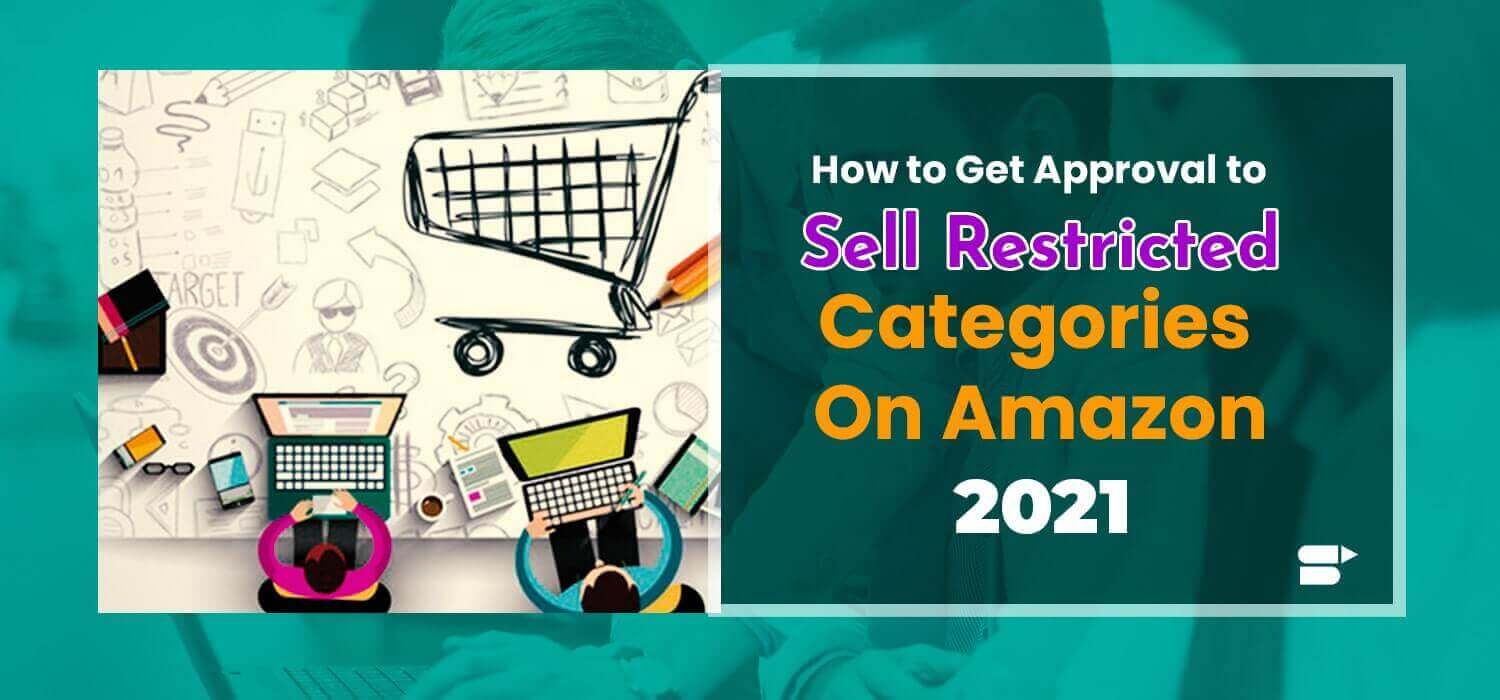Amazon sells every product that you can think of, but that doesn’t mean you should sell just any product on Amazon. The e-commerce giant actively tries to protect its consumers from fraudulent or harmful products. In order to achieve its goals, Amazon has multiple categories that are restricted to most sellers. They are referred to as ‘Restricted Categories’.
What are these categories and how can you get approval to sell products in these categories? With this ultimate guide, we’ll help you get a piece of the restricted pie.
Quick Guide
- Restricted Categories on Amazon
- Restricted Products on Amazon
- Restricted Category Approval: Getting Started
- How To Get Approval To Sell On Amazon
- Amazon Category Approval Services
- Tips To Get Restricted Category Approval
- Conclusion
Restricted Categories on Amazon
Amazon has designated a few categories as ‘restricted’ to protect consumers. Amazon sellers need to get approval before they can sell any products in these categories. Depending on the marketplace and national laws, Amazon has a different list of restricted categories as well as restricted products. In this guide, we will be focusing on Amazon US, but many of the processes to gain approval are the same across countries.
Here is the list of restricted categories in the United States:
- Holiday Selling Requirements in Toys & Games
- Amazon Watch Warranty FAQs
- Made in Italy
- Video, DVD, & Blu-ray
- Collectible Coins
- Streaming Media Players
- Personal Safety and Household products
- Grocery & Gourmet Foods
- Music Category
- Lighting Category
- Beauty Topical
- Sports & Nutrition
- Watches
- Gardening & Watering
- Automotive
- OTC Medication
- Haircare & Beauty Appliances
- Baby Topicals
- Toys
- Pet supplies
- Medical supplies & Equipment
- Pet Care
- Pet Food
- Candles & Aroma Therapy
- Power Tools
- Home Environment Electronics
- Wireless Accessories
- Baby Feeding
- Feminine Hygiene
- Baby Activity Gear
- Baby Strollers and Carriers
- Audio Visual
- Personal Safety & Household
Restricted Products on Amazon
In addition to the categories, there are certain restricted products requiring approval to sell. Some of these products may also be banned on the platform. Amazon also regulates the use of brands, so if you’re planning to sell a product from a well-known brand, make sure that you have permission to do so.
Here’s the list of restricted products in the US:
- Alcohol
- Animals & Animal-Related Products
- Art – Fine Art
- Art – Home Decor
- Automotive and Powersports
- Composite Wood Products
- Cosmetics & Skin/Hair Care
- COVID-19 Supplies
- Currency, Coins, Cash Equivalents, and Gift Cards
- Dietary Supplements
- Drugs & drug paraphernalia
- Electronics
- Explosives, Weapons, and Related Items
- Export Controls
- Food & Beverage
- Gambling & Lottery
- Hazardous and Dangerous Items
- Human Parts & Burial Artifacts
- Jewelry & Precious Gems
- Laser products
- Lighting
- Lock Picking & Theft Devices
- Medical devices and accessories
- Offensive and Controversial Materials
- Pesticides and Pesticide Devices
- Plant and Seed Products
- Postage Meters & Stamps
- Recalled Products
- Recycling electronics
- Subscriptions and Periodicals
- Surveillance Equipment
- Tobacco & Tobacco-Related Products
- Warranties, Service Plans, Contracts, and Guarantees
- Other Restricted Products
- Refrigerants: Ozone-Depleting Substances and Substitutes
- Upholstered Furniture, Bedding, & Other Quilted Products
- CPAP Cleaning and Disinfecting Devices
Just like the list of restricted categories, the list of restricted products is also updated regularly. You can keep track of any changes at Seller Central.
Brand Restrictions On Amazon
Brand restrictions are brands such as Adidas, Nike, Gucci, etc that Amazon sellers are restricted to sell.
Product Condition Restrictions
Amazon includes restrictions on certain product conditions in several categories. These are the categories that are restricted for used items sales:
- Baby Products
- Beauty, Clothing, Accessories & Luggage
- Grocery & Gourmet Food
- Health & Personal Care
- Jewelry Shoes, Handbags & Sunglasses
- Watches
Is It Worth to Sell Restricted Categories on Amazon?
200 million unique monthly customers prefer making their purchases with Amazon over any other store.
Without further doubt, Amazon has a huge customer base and it’s the largest online retailer. Instead of struggling alone, you can utilize the Amazon benefits and reputation, to sell.
But, why restricted categories? It has great benefits, which sellers forgot to notice. It has fewer sellers and, hence, less competition, which increases the chances of your listing being seen and clicked on.
However, Amazon sellers like you, are hesitant to sell those restricted categories, because knowing what has restricted itself is a tedious task.
Along with that, providing the required documents and getting approval is quite frustrating.
That’s the case right? Well, if these frustrations turn easy, you may be selling those restricted categories right.
Restricted Category Approval: Getting Started
Thanks to Amazon’s strict adherence to safety standards and regulations, restricted categories, and products often have less competition. This often means better sales and profits if you’re lucky enough to be part of this exclusive club. Each restricted category has different rules and requires different steps before you get approval to sell. While there is no one-size-fits-all solution, there are a few criteria you need to meet before you’re even considered for approval:
- Be a professional seller
Professional sellers have to pay a monthly subscription fee of $39.99, along with additional selling fees. It also comes with a number of perks to help you in your seller journey. If you’re confused about whether it’s worth going pro, check out this handy guide.
- Have good performance metrics
Good performance metrics are key to ensuring your success on Amazon. To qualify to sell restricted products, your defect rate should be less than 1%, the pre-fulfillment cancel rate should be less than 2.5%, and the late shipment rate should be less than 4%.
- Show proof of product authenticity
Amazon always has the interests of its customers in mind. Unless the product you plan to sell is safe and authentic, you’ll have very little success with your application. In order to establish product authenticity, you need to prove that your supplier is either the manufacturer or a licensed dealer.
- Maintain acceptable invoices for your inventory
Invoices must be dated within 90 days, immediately before your application date. Ensure your invoices are legitimate and make sure the company information on the invoice matches the company information in your Seller Central account. The invoice must contain the name, address, phone number, and website of the company. Double-check the information and make sure there are no discrepancies.
- Maintain a company Website
A company website is not just a tool to help you get approval. If you’re looking to create a lasting brand and want to get in touch with customers directly, a website is often necessary. A good company website is also indicating to Amazon that you are a trustworthy seller.

How To Get Approval To Sell On Amazon
Once you have all your required documents ready to go, requesting access is easy. Just follow these steps and you’re on your way to selling a product in a restricted category:
- Log into your Amazon Seller Central account
From the Inventory, menu select Add a Product.

- Search for the item you want to sell.
- In the search results, click the Listing limitations apply link next to the item.
- Click the Request Approval button to begin the application process.
The application process is different from category to category and from product to product. There is also a possibility that your application may be rejected. If you’re unsure about the status of your application, you can follow these steps and check the categories in which you are allowed to sell products.
- Log in to Seller Central Account
- Select Add Inventory
- Select Add Product
- Click the link Selling Application Status.
Amazon Category Approval Services
If you’re having trouble going through the application process, you could consider using an ‘updating service’. Keep in mind, updating services are not official Amazon service providers. They can help you with the application process but cannot guarantee that your application will be approved.
If you’re struggling with the application process, it might be worthwhile using an updating service, but you can easily complete the process yourself. There are mixed reviews about third-party updating services, so it is recommended that you finish the application yourself if possible.
Tips to Get Restricted Category Approval
While the application process is straightforward and simple, there are always things you can do to increase your odds of getting approved.
- Build a good seller reputation
Getting approved to sell products from restricted categories depends on your Amazon tends to reject applications coming from new sellers. Building up credibility on Amazon takes some time, so it’s a good idea to start from ungated categories and work your way up.
- Apply using brand items
You’re going to have a much better chance of success if you apply using items from well-known brands. Categories and products are restricted to protect consumer interests and minimize the sales of defective or counterfeit goods. So your private label may not always make the cut when applying to update a category. Even if you don’t plan to sell them, using brand items in your application will help your odds in securing Amazon’s approval.
- Check quantities
Make sure you meet the minimum quantity requirements for each invoice. Double-check your application requirements and make sure you meet them.
- Buy local or from the manufacturer
When you’re applying for a restricted category or product approval, make sure you source your product from a local supplier. Amazon rarely accepts invoices from overseas manufacturers for an updating application. If it is possible, purchase directly from the manufacturer to establish the product’s safety and authenticity.
If you’re looking to supercharge your Amazon seller journey, watch this guide to optimize your product listings: How to Create Your First Product Listing on Amazon in 2020? [Step by Step Tutorial]
Research your product
Sellers hear this all the time, but when it comes to restricted categories and products, research is even more important. Before you put up a product listing, make sure you have the approval to sell that product. If you’re found violating Amazon’s policies and restrictions, the e-commerce giant can take the following steps:
- Cancellation of listing
- Limits on listing privileges
- Suspension of listing privileges
- Removal of your listing privileges
- Termination of your agreement and such other arrangements with Amazon.
Once Amazon takes disciplinary action against a seller, it’s difficult to get reinstated.
If you’re a seller participating in Fulfillment by Amazon (FBA), take special care with the products you ship to its fulfillment centers. Hazardous materials that are shipped to Amazon warehouses may be subject to disposal without reimbursement. Therefore, as an Amazon FBA seller, you have to ensure that you don’t violate FBA-specific product restrictions.
Keep in mind, getting approval to sell in a category does not mean you can sell every product in that category. Some subcategories and products may still be restricted and will need further approval to sell.
Conclusion
Getting approval to sell products in restricted categories is not easy, but it is often worth the effort. Once you cross the initial barrier to entry, you set yourself apart from other sellers. Restricted categories are also less saturated, which means less competition. This will help you capture a larger market share and increase your revenue. It also gives you an opportunity to create a great brand and reputation in these categories. If you’re willing to go the extra mile, this is a great opportunity to grow your business.

